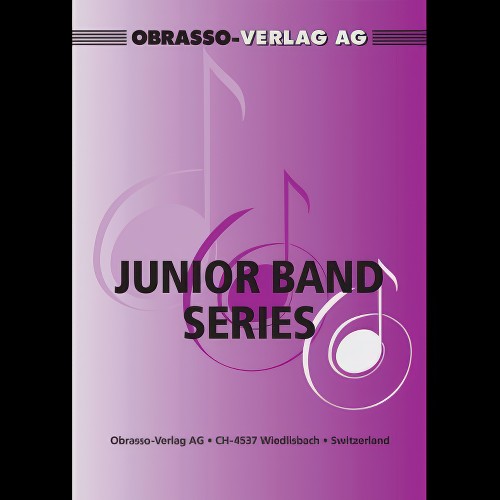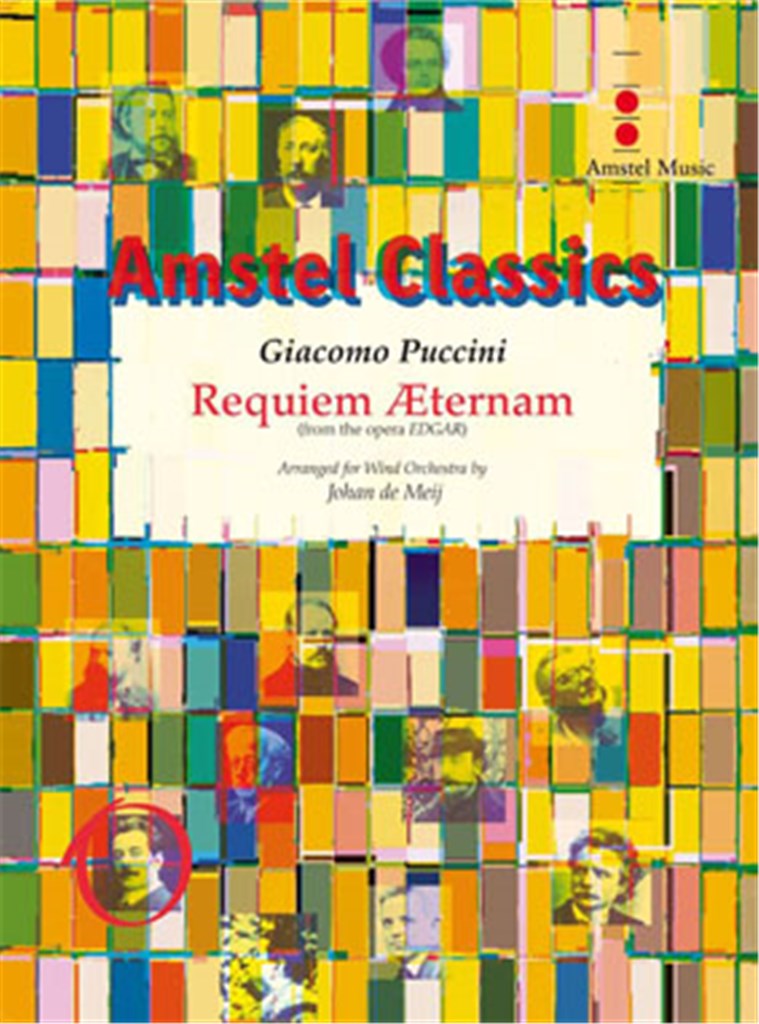Results
-
 £53.60
£53.60Opera Pops (Flexible Ensemble - Score and Parts) - Woodfield, Ray
8 Part Flexible Ensemble and PercussionIncludes:Brindisi from La TraviataCarnival of VeniceAnvil Chorus form Il TrovatoreToreador's Song from CarmenMio Babbino Caro from Gianni SchicciChorus of the Hebrew Slaves from NabuccoGrand March from Aida
Estimated dispatch 7-14 working days
-
 £78.00
£78.00Coronation March - Giacomo Meyerbeer
Giacomo Meyerbeer (1791-1864) was a German opera composer of Jewish origins, who has been described as perhaps the most successful stage composer of the nineteenth century. From 1831 until his death, he remained a dominating figure in the world of opera. His contemporary Hector Berlioz summed up his public career claiming that he 'has not only the luck of being talented, but the talent to be lucky'. His works made him the most frequently performed composer at the world's leading opera houses in the nineteenth century. Giacomo Meyerbeer composed his opera Le Prophte in 1849. In this opera a coronation is preceded by a splendid march. Although the opera itself is rarely performed, the Coronation March has gained a place in the concert repertoire.Franco Cesarini's arrangement for concert band of the Coronation March stands out for its skillful instrumentation which underlines the powerful sounds of this classic concert march.
Estimated dispatch 7-14 working days
-
 £68.99
£68.99Requiem Aeternam - Giacomo Puccini
Giacomo Puccini was commissioned to write a second opera after the resounding success of his first, Le Villi. However, the original four-act, grand opera Edgar, to a libretto by Ferdinando Fontana, received a rather lukewarm reception at its premire in La Scala in Milan in 1889 - initially, the work was only performed three times. Of all the planned performances in the subsequent two years, only one took place, in Lucca, Puccini's birthplace. There, the work was well received. Nevertheless, the composer decided to make drastic changes to Edgar the most radical being the reduction of the opera to three acts, as well as altering a few arias, charactersand instrumental parts. In its revised form, the work was even less popular than before. The discarded fourth act later provided material for Tosca (the duet Amoro sol' per te), but Puccini never felt the need to defend Edgar - as he did other less fortunate operas, such as La Rondine and Suor Angelica. On a piano excerpt for his female friend Sybil Seligman he even corrupted the title to 'E Dio ti GuARda da quest' opera' (may God preserve you from this opera). This did not prevent Arturo Toscanini performing the Requiem from the third act at Puccini's funeral in Milan Cathedral on 3 December 1924. The Requiem in the third act is being played when the long funeral procession carries the alleged body of Edgar - the confusedyoung man hesitating between the love of the virtuous Fidelia and the exotic Tigrana. The mass hails Edgar as a hero, but a monk claims that he has betrayed his country for a few gold pieces. When the soldiers try to desecrate the body, they discover that the armor contains none. The monk reveals himself as Edgar. He wants to leave with his faithful Fidelia, but the vengeful Tigrana stabs him and kills Fidelia. Edgar grieves over the lifeless body of his beloved, while Tigrana is arrested and the people submerge into prayer.
Estimated dispatch 7-14 working days
-
 £104.99
£104.99Prelude and Polonaise - Nikolai Rimsky-Korsakov
Nikolai Rimsky-Korsakov (1844-1908) composed his opera The Night before Christmas in 1894-95. The premiere took place on December 10 1895 in St. Petersburg. The libretto to the opera came from Rimsky-Korsakov himself and is based on a tale by Nikolai Gogol, which some years earlier had already served as operatic material for Pjotr Tchaikovsky. The opera tells the story of Vakula, the blacksmith of a small Ukranian village. He is madly in love with Oxana who demands - as proof of his love - a most unusual Christmas present: the magnificent slippers of the Empress. Knowing full well that, in normal circumstances, he would never be able to fulfil Oxana's wish, Vakula seekssupernatural assistance and finds it in the shape of the devil, who comes up with a ploy to help him. The devil carries him on his back to St. Petersburg, where during a lavish reception at court Vakula finds an opportunity to present his request to the empress. The Empress actually agrees to Vakula's wish and hands over her slippers to him. Thereupon he returns to his own village. Here, in the meantime, he had been given up for dead, and Oxana had been plunged into great sorrow as she had come to realise that she also truly loved Vakula. In the end, however, all misunderstandings are resolved and all adversities overcome: Oxana receives her extravagant present, the lovers are united, and the church bells call the villagers to the Christmas service.The vibrant Polonaise is played in the 3rd act of the opera at the entrance of the Empress, whose appearance is anticipated in the prelude by the fanfare motives. The music paints a vivid picture of the party atmosphere and the marvellous dcor at the imperial court of St. Petersburg, which Rimsky-Korsakov conjures up in his opera and which can also be played outside of the Advent and Christmas season, for example as an opening piece to any festive concert.
Estimated dispatch 7-14 working days
-
 £68.00
£68.00Requiem Aeternam (from Edgar) (Concert Band - Score and Parts) - Puccini, Giacomo - De Meij, Johan
Giacomo Puccini was commissioned to write a second opera after the resounding success of his first, Le Villi. However, the original four-act, grand opera Edgar, to a libretto by Ferdinando Fontana, received a rather lukewarm reception at its premiere in La Scala in Milan in 1889. Initially, the work was only performed three times. Of all the planned performances in the subsequent two years, only one took place, in Lucca, Puccini's birthplace. There, the work was well received. Nevertheless, the composer decided to make drastic changes to Edgar the most radical being the reduction of the opera to three acts, as well as altering a few arias, characters and instrumental parts. In its revised form, the work was even less popular than before. The discarded fourth act later provided material for Tosca (the duet Amoro sol' per te), but Puccini never felt the need to defend Edgar as he did other less fortunate operas, such as La Rondine and Suor Angelica. On a piano excerpt for his female friend Sybil Seligman he even corrupted the title to 'E Dio ti Guarda da quest' opera' (may God preserve you from this opera). This did not prevent Arturo Toscanini performing the Requiem from the third act at Puccini's funeral in Milan Cathedral on 3 December 1924. The Requiem in the third act is being played when the long funeral procession carries the alleged body of Edgar, the confused young man hesitating between the love of the virtuous Fidelia and the exotic Tigrana. The mass hails Edgar as a hero, but a monk claims that he has betrayed his country for a few gold pieces. When the soldiers try to desecrate the body, they discover that the armor contains none. The monk reveals himself as Edgar. He wants to leave with his faithful Fidelia, but the vengeful Tigrana stabs him and kills Fidelia. Edgar grieves over the lifeless body of his beloved, while Tigrana is arrested and the people submerge into prayer. Duration: 3.30
Estimated dispatch 7-14 working days
-
 £104.99
£104.99Ballabili (Concert Band - Score and Parts) - Verdi, Giuseppe - Van der Beek, Wil
Giuseppe Verdi's opera Macbeth was written in 1846/47 and premiered in Florence. It is based on Shakespeare's Macbeth and, unlike Verdi's other operas, had relatively little broad impact. This may be due to the difficulty of the singing voices, the lack of a love story or the dark mood, without humorous scenes.Musically, however, this opera is not uninteresting. Among other things, all the dramatic highlights culminate in artistically built ensembles. It also contains interesting instrumental effects, such as a wind orchestra under the stage in the witch scenes. This makes the witches and air spirits seem like from another world. In the 19th century opera, such a wind band, a so-called "banda" was not uncommon but an integral part of the scene.The Ballabili comes from Act III of Verdi's opera MacBeth. Ballabili is the plural of the Italian ballabile, meaning "danceable." It can also mean a dance performed by the corps de ballet, or by the chorus in an opera; or the music to accompany this dance.Duration: 2:15
Estimated dispatch 7-14 working days
-
 £183.20
£183.20Danser fra "Kosakkene" - Catharius Elling
The Opera "The Cossacs" by Catharinus Elling is based on the Nikolai Gogol novel about Taras Bulba."The Cossacs" was premiered in 1897 at Eldorado in Kristiania (the old name on Norway's capitol Oslo). Despite positive response in the papers of that time, the opera was newer performed again in it's entirely. The Norwegian Broadcasting Corporation have an abbreviated recording in it's archives, but no complete performance is known to date.The Norwegian National Opera Orchestra recorded both the overture and the dances in 2021, conducted by Ingar Bergby. Thet are both a part of the CD "Norwegian Opera Overtures".This arrangement is not commissioned by anyone, but rather written to better the availability of quality Norwegian orchestral music arranged for Concert Band.This edition is a good opportunity to be more familiar with Norwegian heritage of orchestral music.
Estimated dispatch 7-14 working days
-
£94.99
Operatica - James L. Hosay
If you seek truly dramatic music, look to opera. Opera has been enormously influential on Classical, Popular, and Film and Television music over the years. James L. Hosay's new intermediate level piece, OPERATICA, incorporates the important elements of Opera and Classical music to bring exhilarating drama to the concert band stage. Style and technical considerations make this a rich learning experience for the band. Add in the dimension of music history by studying Opera and Classical music, and you have a wonderful teaching tool! The grand theme explores a multitude of colors as it twists and turns its way through opera-style development and variation. Whether for formal, festival,or spring concert use, you will find this to be a thrilling addition to your library.Opulent!
Estimated dispatch 7-14 working days
-
£134.99
Cos fan tutte - Wolfgang Amadeus Mozart
In 1786 Mozart composed his wonderful opera Le Nozze di Figaro (KV 492). The Italian libretto, based on the play Le mariage de Figaro by Beaumarchais, was written by Lorenzo da Ponte--who also made the libretti of Mozart's opera's Don Giovanni and Cos fan tutte. In the opera Le Nozze di Figaro, Count Almaviva tries to seduce the fiance of Figaro, his valet. Eventually, through four acts full of complicated intrigue, he is outwitted. In his music, Mozart--at times in a humorous way--reflects the numerous social and erotic intrigues with both empathy and insight. The brilliant overture is just as vivacious and witty as the opera itself. Mozart delightfullyanticipates the passion and playful love that is to come. The skillful transcription for concert band by Tohru Takahashi certainly does justice to this appealing music.
Estimated dispatch 7-14 working days
-
 £94.99
£94.99Soldiers' Chorus (Concert Band - Score and Parts)
The tale of Faust, who sold his soul to the devil in exchange for knowledge and power, has been a source of inspiration for many authors, poets, film directors and composers. Among these is the French composer Charles Gounod whose opera Faust was first performed in 1859. This charming Soldiers' Chorus is one of the most famous melodies from the opera. Its musical simplicity and beauty fits any concert programme that needs a well-known classical arrangement. The tale of Faust, who sold his soul to the devil in exchange for knowledge and power, has been a source of inspiration for many authors, poets, film directors and composers. Among these is the French composer Charles Gounod whose opera Faust was first performed in 1859. This charming Soldiers' Chorus is one of the most famous melodies from the opera. Its musical simplicity and beauty fits any concert programme that needs a well-known classical arrangement. 0:03:11
Estimated dispatch 7-14 working days
